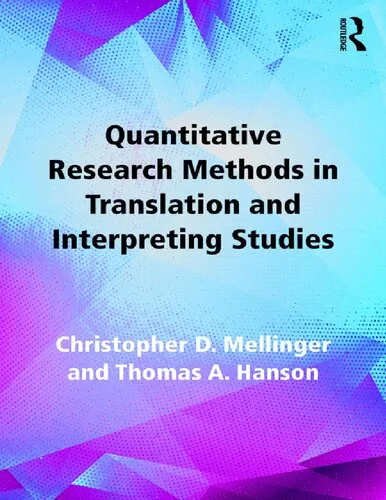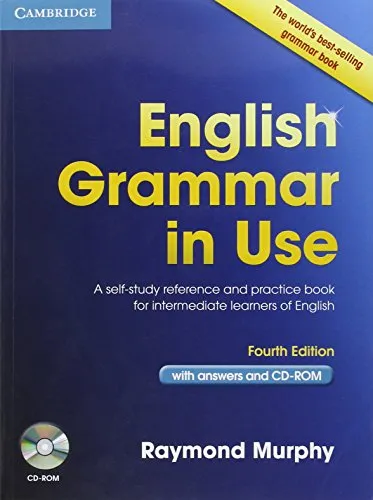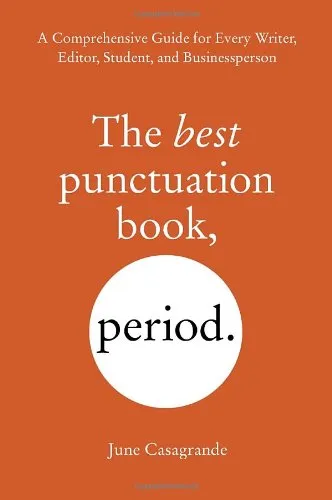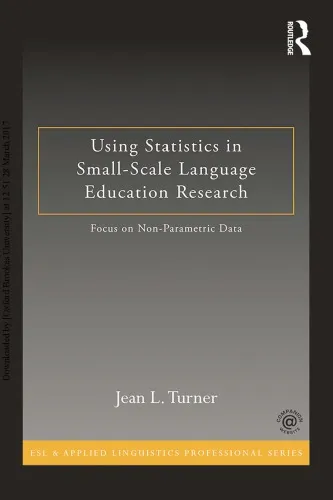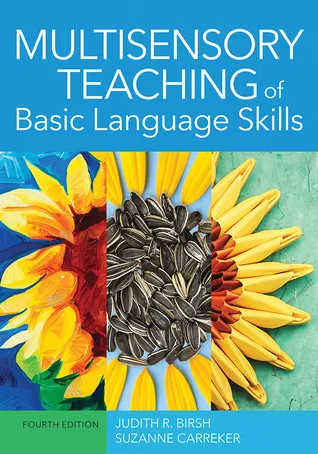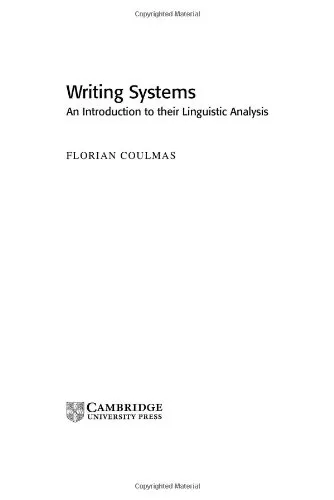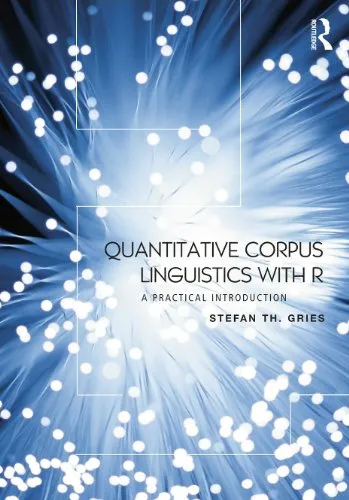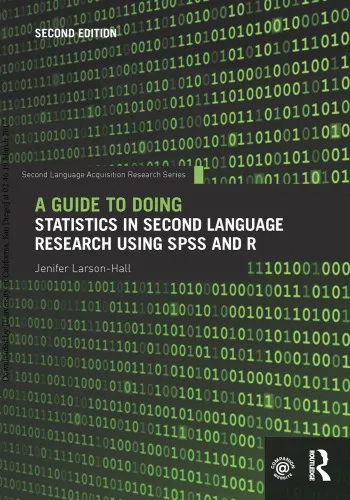Quantitative Research Methods in Translation and Interpreting Studies
4.0
بر اساس نظر کاربران

شما میتونید سوالاتتون در باره کتاب رو از هوش مصنوعیش بعد از ورود بپرسید
هر دانلود یا پرسش از هوش مصنوعی 2 امتیاز لازم دارد، برای بدست آوردن امتیاز رایگان، به صفحه ی راهنمای امتیازات سر بزنید و یک سری کار ارزشمند انجام بدینکتاب های مرتبط:
معرفی جامع کتاب «Quantitative Research Methods in Translation and Interpreting Studies»
کتاب «Quantitative Research Methods in Translation and Interpreting Studies» یکی از منابع برجسته و شناختهشده در حوزه ترجمه و تفسیر است. نویسندگان این کتاب، Christopher D. Mellinger و Thomas A. Hanson، با بهرهگیری از تخصص و دانش خود، به طور جامع به تکنیکهای تحقیق کمی (Quantitative Research) در مطالعات ترجمه و تفسیر پرداختهاند. این کتاب با هدف ارائه ابزارهای عملی و راهبردهای گامبهگام، به پژوهشگران و دانشجویان کمک میکند تا در زمینه روشهای تحقیق کمی مهارت پیدا کنند.
خلاصهای جامع از کتاب
این کتاب در درجه اول به معرفی اصول پایه و ابزارهای مورد نیاز برای انجام تحلیلهای کمی در Translation Studies و Interpreting Studies میپردازد. نویسندگان، با توضیح روشهای جمعآوری و تحلیل دادهها، پژوهشگران را با تکنیکهایی چون Statistics، Data visualization، Surveys و Experiments آشنا میکنند. این کتاب ترکیبی از نظریه و عمل است و مثالهای واقعی از پروژههای پژوهشی ترجمه و تفسیر را در بر میگیرد که باعث شده تا موضوعاتی مانند Validity، Reliability و Research Design به زبان ساده و دسترسپذیر بیان شود.
از جمله بخشهای برجسته این کتاب میتوان به رویکردهای آماری مختلف، روشهای جدید در تحلیل دادهها، و چگونگی ارزیابی تحقیقات قبلی اشاره کرد. همچنین فصولی بهطور خاص به استفاده از نرمافزارهای تحلیل آماری اختصاص داده شده است که برای بسیاری از پژوهشگران این حوزه ارزشمند است.
نکات کلیدی کتاب
- آشنایی با فرآیندهای پایه تحقیق کمی و تطبیق آنها در Translation and Interpreting Studies.
- ارائه روشهایی برای طراحی Research Questions قوی و مرتبط.
- توضیح Techniques for Data Analysis و نحوه مدیریت دادهها.
- بررسی چالشهای مرتبط با Quantitative Methods در مطالعات تطبیقی و کاربردی ترجمه.
- آموزش استفاده از ابزارهایی مانند SPSS و R برای تحلیل دادههای پیچیده در مطالعات زبانشناسی.
جملات مشهور از کتاب
"Quantitative research in translation and interpreting studies bridges the gap between theory and practice, creating meaningful insights for the field."
"Data is not just numbers but the foundation for uncovering patterns and trends in translation behavior."
چرا این کتاب اهمیت دارد؟
اهمیت این کتاب به چندین دلیل برجسته است. اول این که نویسندگان تلاش کردهاند تا مفاهیم پیچیده آماری و تحقیقاتی را به زبانی ساده و با روشهای عملی توضیح دهند. این موضوع باعث میشود که کتاب نهتنها برای پژوهشگران تازهکار، بلکه برای افراد حرفهای نیز مفید باشد. دوم، تمرکز کتاب بر Translation and Interpreting Studies بهطور خاص باعث شده است تا ابزارها و روشها به صورت موضوعمحور و هدفمند طراحی شوند.
از سوی دیگر، این کتاب در محیط آکادمیک بسیار مورد استناد قرار گرفته است و به یکی از منابع اصلی برای طراحی و اجرای تحقیقات کمی در این حوزه تبدیل شده است. همچنین، ارائه Case Studies واقعی چیزی است که این کتاب را از بسیاری منابع مشابه متمایز میکند.
Introduction to "Quantitative Research Methods in Translation and Interpreting Studies"
"Quantitative Research Methods in Translation and Interpreting Studies" by Christopher D. Mellinger and Thomas A. Hanson is an essential guide for researchers, students, and professionals in the field of Translation and Interpreting Studies (TIS). This book offers a comprehensive introduction to the concepts, methodologies, and tools necessary for conducting quantitative research effectively in this dynamic academic domain. It strives to fill a gap in the field, where quantitative approaches are underrepresented compared to qualitative approaches, by encouraging methodological rigor and interdisciplinary engagement.
The book is rooted in a clear pedagogical approach, providing step-by-step guidance to empower readers with the foundational knowledge and skills needed to design, conduct, and analyze their own research. Whether you are a novice exploring quantitative methods for the first time or an experienced scholar looking for insights into best practices, this book is designed to build your confidence in quantitative research while inspiring critical thinking about its applications in TIS.
Detailed Summary of the Book
"Quantitative Research Methods in Translation and Interpreting Studies" serves as a comprehensive roadmap to understanding foundational concepts of quantitative research in TIS. The book is organized into several chapters that systematically present and explain fundamental concepts, tools, and processes. The authors cover topics such as defining research questions, designing surveys, selecting appropriate statistical methods, and interpreting results in meaningful ways.
In its early chapters, the book introduces readers to the role and importance of quantitative methods in research. It addresses essential concepts like operationalizing variables, sampling techniques, and data collection methodologies that are critical when working with diverse linguistic and cultural data. Additionally, it provides a clear and accessible explanation of statistics, removing the intimidation often associated with this field of inquiry.
Subsequent chapters delve deeper into popular quantitative methods such as descriptive statistics, inferential statistics, correlation analysis, and regression models. The authors incorporate real-world examples from Translation and Interpreting Studies to demonstrate practical applications of these concepts. Case studies, practical exercises, and illustrative examples ensure that readers not only understand the theories but also acquire the requisite skills to apply them in their own research contexts.
The book also emphasizes ethical considerations, the dissemination of results, and the importance of replicability and transparency in research. Each chapter concludes with a summary, ensuring comprehension and reinforcing key points. The pragmatic approach makes this book an indispensable resource for students, researchers, and practitioners eager to embrace quantitative methods in Translation and Interpreting Studies.
Key Takeaways
- A foundational understanding of quantitative research and its relevance to TIS.
- Practical guidance on designing research studies and collecting data effectively.
- Insights into statistical techniques such as descriptive and inferential statistics.
- A strong emphasis on ethical principles and transparency in research practices.
- Real-world illustrations and case studies to bridge theory and practical application.
By the end of the book, readers are equipped to conduct their own quantitative studies independently, contributing valuable empirical insights to the field of Translation and Interpreting Studies.
Famous Quotes from the Book
"Quantitative research is not just about numbers. It is about using systematic approaches to reveal patterns, understand phenomena, and challenge assumptions in Translation and Interpreting Studies."
"No research methodology is inherently superior; the choice of method should be dictated by the research question, and understanding both qualitative and quantitative approaches can only enrich the field."
Why This Book Matters
Translation and Interpreting Studies is a growing field that plays a crucial role in bridging linguistic and cultural divides in an increasingly interconnected world. However, the systematic application of quantitative methods in this field has been relatively limited. "Quantitative Research Methods in Translation and Interpreting Studies" addresses this gap by offering a rigorous and accessible guide that empowers researchers to expand the boundaries of knowledge in TIS.
This book stands out because it not only teaches statistical concepts but also contextualizes them within the specific challenges and opportunities of TIS research. By doing so, it encourages researchers to adopt evidence-based approaches and contribute to building a robust body of empirical research in the domain.
Furthermore, the book’s emphasis on ethics, transparency, and replicability aligns with contemporary research best practices, ensuring that readers prioritize integrity and accountability in their studies. This makes it a timely and highly relevant resource for the global community of translation and interpreting scholars and practitioners.
Whether you are a student, an academic, or a practitioner, this book offers the tools and insights you need to engage quantitatively in one of the most dynamic and impactful fields of study today.
دانلود رایگان مستقیم
شما میتونید سوالاتتون در باره کتاب رو از هوش مصنوعیش بعد از ورود بپرسید
دسترسی به کتابها از طریق پلتفرمهای قانونی و کتابخانههای عمومی نه تنها از حقوق نویسندگان و ناشران حمایت میکند، بلکه به پایداری فرهنگ کتابخوانی نیز کمک میرساند. پیش از دانلود، لحظهای به بررسی این گزینهها فکر کنید.
این کتاب رو در پلتفرم های دیگه ببینید
WorldCat به شما کمک میکنه تا کتاب ها رو در کتابخانه های سراسر دنیا پیدا کنید
امتیازها، نظرات تخصصی و صحبت ها درباره کتاب را در Goodreads ببینید
کتابهای کمیاب یا دست دوم را در AbeBooks پیدا کنید و بخرید
1417
بازدید4.0
امتیاز0
نظر98%
رضایتنظرات:
4.0
بر اساس 0 نظر کاربران
Questions & Answers
Ask questions about this book or help others by answering
No questions yet. Be the first to ask!
